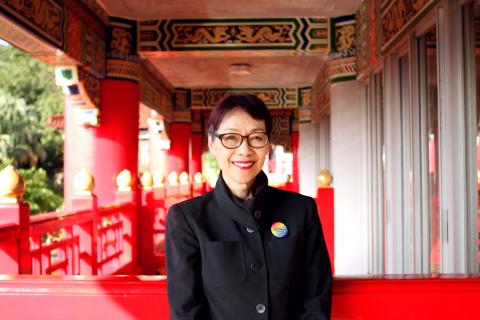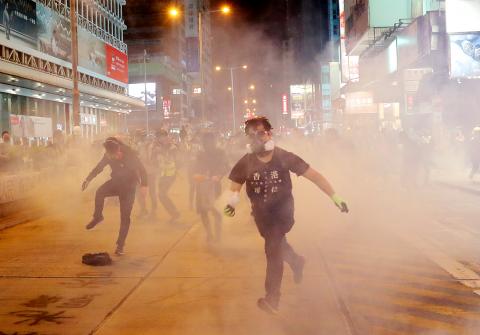Sharon Hom (譚競嫦) can’t decide whether to laugh or cringe at how young protesters in Hong Kong, part of her unofficial “fan club,” have turned her into an Internet meme.
The legal academic and executive director of Human Rights in China (HRIC) — a non-government organization based in New York and Hong Kong — has been adjusting to online fame since her forceful defense of Hong Kong’s ongoing protest movement at a US congressional hearing on Sep. 17.
In her testimony, Hom painted a picture of the “David and Goliath” standoff between Hong Kongers and Beijing, detailing China’s rule of law deficits and efforts to discredit the protest movement, as well as the erosion of public confidence in Hong Kong’s administration.

Photo: Davina Tham, Taipei Times
“President Tsai Ing-wen’s (蔡英文) takeaway from the current political crisis in Hong Kong hits the nail on the head,” Hom told the US Congressional-Executive Commission on China. “Not only is ‘one country, two systems’ not a viable model for Taiwan, but the Hong Kong example proves that dictatorship and democracy cannot co-exist.”
On popular online forum LIHKG, Hong Kongers have taken to calling her “Sharon E E,” a romanization of the Cantonese word for “auntie.” The term of endearment captures their affection for Hom, 68, and their perception of her as protector, mentor and friend.
Unlike her comrades, Hom was born but did not grow up in Hong Kong. At the age of five her family left for New York, where today she directs the China and International Human Rights Research Program at the New York University School of Law and serves as Professor of Law Emerita at the City University of New York.

Photo: REUTERS
In town last week for the congress of the International Federation of Human Rights, Hom spoke with the Taipei Times about her views on the endgame for Hong Kong’s protest movement.
IMPERFECT MOVEMENT
Hom’s congressional testimony, targeted at an international audience, struck a chord with many Hong Kongers who lauded it as a fair account of the protest movement. But the message she bears for that movement is one of tough love.
“For the young Hong Kongers, particularly at the front-line, the message they need to hear is: It’s a huge mistake to view mainlanders as a monolithic mass, as an enemy,” Hom says.
In a report by the Central News Agency earlier this month, several Chinese college students in Taiwan said that they supported the protests, but had kept silent about their views for their safety. One Chinese student criticized the “blind patriotism” of her fellow students.
Despite differing views held by some Chinese nationals, there is a growing impression that parts of the protest movement are evolving into a nativist crusade, after incidents in which Chinese immigrants or visitors appeared to be targeted.
Earlier this month, a Mandarin-speaking JPMorgan employee was filmed being punched by a black-clad protester outside the bank’s offices after he had told a gathering crowd, “We are all Chinese.”
In August, protesters at the Hong Kong International Airport restrained two Chinese men, one of whom was a reporter for the Chinese Communist Party (CCP) mouthpiece The Global Times. Images of the incident showed their hands bound with cable ties. Some protesters returned to the airport the next day to express remorse, holding signs that read: “We were desperate and we made imperfect decisions.”
Hom says that the movement is starting to reckon with these complexities. In conversations with protesters, she reminds them of the necessity to look for allies everywhere, even the unexpected places, in order to build a sustainable movement.
“Some of the young activists, I think, are beginning to move to that point of saying, ‘They’re not all our enemies,’” she says.
Such discretion also serves to counter the possibility that continued protests could force Beijing’s hand to take more drastic actions to quell the unrest, as some circumspect observers have warned.
While a majority of protesters are engaged in peaceful demonstration, Hom says “there’s a piece of the movement that is playing into that hand,” and that the movement as a whole will have to decide how to address its more “extreme” elements.
“I think they’re having that conversation now,” she says. “This is why I’m hopeful, because I think they recognize some of the tensions, they recognize some of the conflicts, and they are engaging in it, in a way that I think is so much more nuanced.”
EFFECTIVE EXCHANGE
In the meantime, heightened emotions are spilling over into overseas college campuses, where heated confrontations between students have added to the topography of unrest surrounding the protest movement.
In Australia, Canada, New Zealand and the US, reports of clashes between students from Hong Kong and mainland China and their respective sympathizers have raised alarm about polarization and political influence in schools.
In Taiwan, reports of vandalized “Lennon walls”, which are used to express solidarity with the protesters, and even physical aggression between disagreeing schoolmates have also emerged from college campuses.
Such incidents have prompted a rethink of the notion that moving to a more liberal environment is enough to impress the value of democracy on young people who grew up in China — a mindset that Hom dismisses as the “exchange program mentality.”
“This idea that if you just go, you’re going to absorb something, it’s not true,” she says. “It’s not osmosis, it’s work.”
After the Umbrella Movement, HRIC launched a series of conversations aimed at promoting understanding between young Hong Kongers and mainland Chinese living in Hong Kong.
Hom, who ran legal education exchanges between the US and China for more than a decade, says that the dialogues revealed a lack of socialization between both groups. Since then, she has consistently recommended that exchange programs provide a space for overseas students to discuss and analyze their experiences in their new environment.
“To learn something is work. If you’re exposed to a different culture, you need to process it,” she adds.
‘DEMOCRACY IS INEVITABLE’
Learning is a recurrent theme with Hom, whose years in academia also spanned a two-year Fulbright Scholarship to Beijing in the 1980s. Not long after returning to the US, the Tiananmen Square Massacre took place in June 1989. Her human rights work would later include the Tiananmen Mothers — a human rights group of more than 120 people whose children or relatives were killed in the massacre.
Hom says that Hong Kong Chief Executive Carrie Lam’s (林鄭月娥) strategy for responding to the protest movement has been “a complete page out of... the Communist Party’s playbook,” reminiscent of CCP efforts to “buy off” the Chinese people with economic prosperity after the Tiananmen Square Massacre.
In an annual policy address earlier this month, Lam’s focus on housing and economic measures fueled protesters’ criticisms that she was deaf to their demands for political reform.
This cycle of history repeating itself could inspire cynicism. But Hom remains optimistic about democracy and human rights activists’ ability to learn from past struggles. She traces the hope and steadfastness of today’s protesters back to the “spirit capital” gained during the 2014 Umbrella Movement, and describes the collective decision-making of that earlier movement as “the embryo of a lot of what’s happening now.”
Back in 2004, Hom testified at another congressional hearing on “15 Years After Tiananmen: Is Democracy in China’s Future?” Her answer then was an unequivoval yes: “Democracy is inevitable because the aspirations, hopes, and the willingness to struggle for a more open and democratic China are still powerfully present and alive — against all odds.”
Another 15 years later, Hom says this hasn’t changed.
“[Democracy] is not inevitable in a linear time progression, it’s inevitable because all people really have that aspiration in them,” she says. “It’s just who we are as people.”

On April 26, The Lancet published a letter from two doctors at Taichung-based China Medical University Hospital (CMUH) warning that “Taiwan’s Health Care System is on the Brink of Collapse.” The authors said that “Years of policy inaction and mismanagement of resources have led to the National Health Insurance system operating under unsustainable conditions.” The pushback was immediate. Errors in the paper were quickly identified and publicized, to discredit the authors (the hospital apologized). CNA reported that CMUH said the letter described Taiwan in 2021 as having 62 nurses per 10,000 people, when the correct number was 78 nurses per 10,000

As we live longer, our risk of cognitive impairment is increasing. How can we delay the onset of symptoms? Do we have to give up every indulgence or can small changes make a difference? We asked neurologists for tips on how to keep our brains healthy for life. TAKE CARE OF YOUR HEALTH “All of the sensible things that apply to bodily health apply to brain health,” says Suzanne O’Sullivan, a consultant in neurology at the National Hospital for Neurology and Neurosurgery in London, and the author of The Age of Diagnosis. “When you’re 20, you can get away with absolute

May 5 to May 11 What started out as friction between Taiwanese students at Taichung First High School and a Japanese head cook escalated dramatically over the first two weeks of May 1927. It began on April 30 when the cook’s wife knew that lotus starch used in that night’s dinner had rat feces in it, but failed to inform staff until the meal was already prepared. The students believed that her silence was intentional, and filed a complaint. The school’s Japanese administrators sided with the cook’s family, dismissing the students as troublemakers and clamping down on their freedoms — with

As Donald Trump’s executive order in March led to the shuttering of Voice of America (VOA) — the global broadcaster whose roots date back to the fight against Nazi propaganda — he quickly attracted support from figures not used to aligning themselves with any US administration. Trump had ordered the US Agency for Global Media, the federal agency that funds VOA and other groups promoting independent journalism overseas, to be “eliminated to the maximum extent consistent with applicable law.” The decision suddenly halted programming in 49 languages to more than 425 million people. In Moscow, Margarita Simonyan, the hardline editor-in-chief of the